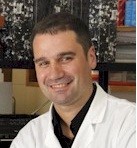Personalised Medicine in Multiple Sclerosis
University of Milano-Bicocca, Milan, Italy
13-15 September 2017
Giampaolo Brichetto | Tobias Derfuss | Eric J. Downer | Maria Foti | Robin Franklin | Robert Fruscio | Hanne Flinstad Harbo | Kerstin Hellwig | Gianvito Martino | Paul M. Matthews | Rosa Maria Moresco | David Otaegui Bichot | Jean-Philippe Ranjeva | Juha Rinne | Veerle Somers | Maria Trojano
National Coordinator Research in Rehabilitation at Italian MS Foundation
Giampaolo Brichetto joined the Foundation of Italian MS Society (FISM) on March 2009, where he currently holds the position of National Coordinator of Research in Rehabilitation. He has an research experience of 14 years in neuro-rehabilitation: Parkinson’s disease, stroke, traumatic brain injury and Multiple Sclerosis.
His whole carrier efforts aimed at improving neuro-rehabilitation strategies for MS by integrating traditional rehabilitation techniques with bio-tech devices, improving cognitive rehabilitation strategies by delivering rehab trough m-health devices and by enhancing rehabilitation outcome measures for clinical and research purposes.
He has been awarded in 2010 “Best Platform Awards” CMSC San Antonio, Texas; in 2013 “Best Poster Awards” RIMS Copenhagen, Denmark; in 2014 “Best Platform Awards” CMSC Dallas, Texas.
Selected publications:
1) Pedullà L., Brichetto G., Tacchino A., Vassallo C., Zaratin P., Battaglia M.A., Bonzano L., Bove M..(2016), Adaptive vs. non-adaptive cognitive training by means of a personalized App: a randomized trial in people with Multiple Sclerosis, J Neuroeng Rehabil. 2016 Oct 4;13(1):88. PubMed PMID: 27716336; PubMed Central PMCID: PMC5050994.
2) Solaro C., Trabucco E., Signori A., Cella M., Messmer Uccelli M., Brichetto G., Cavalla P., Gironi M., Patti F., Prosperini L. (2015), Italian validation of the 12-item Multiple Sclerosis walking scale, Mult Scler. doi:10.1155/2015/540828. PubMed PMID: 25883806; PubMed Central PMCID: PMC4391321.
3) Brichetto G., Piccardo E., Pedullà L., Battaglia M.A., Tacchino A. (2015), Tailored balance exercises on people with Multiple Sclerosis: A pilot randomized, controlled study, Mult Scler. 21(8): 1055-63. doi: 10.1177/1352458514557985. PubMed PMID: 25392337.
Professor of Neurology at Departments of Neurology and Biomedicine, University Hospital of Basel, Basel, Switzerland
Tobias Derfuss is a clinical neurologist with a specialization in neuroimmunology. He received his clinical training at the Department of Neurology at the Klinikum Grosshadern in Munich. His research at the Max-Planck Institute for Neurobiology, Department of Neuroimmunology, was focused on the discovery of new autoantigens in Multiple Sclerosis and the characterization of the immune response against latent herpesviruses. After training in neuromuscular diseases at the Friedrich-Baur Institute and in psychiatry at the Max-Planck Institute for Psychiatry in Munich he was appointed head of the out-patient department and MS clinic at the Department of Neurology of the university clinic in Erlangen.
Since 2010 he is assistant professor and senior physician at the Department of Neurology and the Department of Biomedicine at the University Clinic in Basel. His main research focus is the discovery of biomarkers and the analysis of the mode of action of disease modifying treatments in MS. Especially the role of B cells in the pathogenesis of MS and the interaction of B cells with their target cells are explored in cell culture as well as in in vivo systems. He is also involved in the design and conduct of clinical trials for newly emerging therapies in MS.
Selected publications:
1) Sanderson N.S., Zimmermann M., Eilinger L., Gubser C., Schaeren-Wiemers N., Lindberg R.L., Dougan S.K., Ploegh H.L., Kappos L., Derfuss T. (2017), Cocapture of cognate and bystander antigens can activate autoreactive B cells, Proc Natl Acad Sci U S A, 114(4): 734-739. doi: 10.1073/pnas.1614472114. PubMed PMID: 28057865; PubMed Central PMCID: PMC5278454.
2) Kappos L., Arnold D.L., Bar-Or A., Camm J., Derfuss T., Kieseier B.C., Sprenger T., Greenough K., Ni P., Harada T. (2016), Safety and efficacy of amiselimod in relapsing Multiple Sclerosis (MOMENTUM): a randomised, double-blind, placebo-controlled phase 2 trial, Lancet Neurol., 15(11): 1148-59. doi: 10.1016/S1474-4422(16)30192-2. PubMed PMID: 27543447.
3) Pröbstel A.K., Kuhle J., Lecourt A.C., Vock I., Sanderson N.S., Kappos L., Derfuss T. (2016), Multiple Sclerosis and Antibodies against KIR4.1. N Engl J Med.,374(15): 1496-8. doi: 10.1056/NEJMc1507131. PubMed PMID: 27074084.
Assistant Professor in Human Health and Disease and Director of BSc in Human Health and Disease programme, Trinity College Dublin, Dublin, Ireland
Eric Downer is an Assistant Professor in Human Health and Disease at Trinity College Dublin (TCD), and acts as Director of the BSc in Human Health and Disease programme. He is currently involved in teaching Physiology to Medical, Science and Human Health and Disease students.
He graduated from TCD with a first class honours degree in Physiology (2001) and a Ph.D in Neuroscience (2005). He began his postdoctoral research career in the Physiology department at TCD (2005-2008) and was subsequently awarded a postdoctoral fellowship from the Irish Research Council that enabled him to develop his own research programme based at NUI Maynooth (2008-2010). In 2011 he returned as a senior research fellow at TCD, also acting as co-ordinator of the PRTLI PhD programme at TCD (2012). He was appointed to his first academic position in UCC in January 2013, where he was a lecturer and Principal Investigator in the Department of Anatomy and Neuroscience (Jan 2013-May 2015) and also the Director of the Biosciences Imaging Centre (June 2014-May 2015). In June 2015 he was appointed as Assistant Professor at TCD, where he leads an active research group conducting patient-orientated research in the field of Multiple Sclerosis. To date he has published 33 articles and over 40 conference proceedings. He has been honoured with the Royal Academy of Medicine in Ireland Early Career Award in 2009, the Neuroscience Ireland Early Career Investigator Award in 2013 and the Deans Award for Teaching and Learning at TCD (2016).
Selected publications:
1) Barry A., Cronin O., Ryan A.M., Sweeney B., Yap S.M., O’Toole O., Allen A.P., Clarke G., O’Halloran K.D., Downer E.J. (2016), Impact of Exercise on Innate Immunity in Multiple Sclerosis Progression and Symptomatology, Front Physiol., 7:194.
doi: 10.3389/fphys.2016.00194. Review. PubMed PMID: 27313534; PubMed Central PMCID: PMC4889582.
2) Crowley T., Cryan J.F., Downer E.J., O’Leary O.F. (2016), Inhibiting neuroinflammation: The role and therapeutic potential of GABA in neuro-immune interactions, Brain Behav Immun., 54: 260-77.
doi: 10.1016/j.bbi.2016.02.001. Review. PubMed PMID:26851553.
3) Crowley T., Fitzpatrick J.M., Kuijper T., Cryan J.F., O’Toole O., O’Leary O.F., Downer E.J. (2015), Modulation of TLR3/TLR4 inflammatory signaling by the GABAB receptor agonist baclofen in glia and immune cells: relevance to therapeutic effects in multiple sclerosis, Front Cell Neurosci., 9:284.
doi: 10.3389/fncel.2015.00284.PubMed PMID: 26283920; PubMed Central PMCID: PMC4516894.
Assistant professor at University of Milano-Bicocca, Milan, Italy
Maria Foti graduated and obtained her PhD in Biotechnology at the University of Milan in 1996. She studied the molecular mechanisms associated with early events during dendritic cells activation and maturation. From these studies a role of dendritic cells in innate immunity was suggested.
In 2004 she became assistant professor at the University of Milano-Bicocca, where she headed the Research Team of Genopolis, a public Consortium devoted to functional Genomics studies.
Her current research work is mainly devoted to the understanding of the molecular mechanisms underlying the pathophysiology of autoimmune diseases (AIDs). An additional goal of her research group is to develop blood-based diagnostic for AIDs such as Multiple Sclerosis by using expression profiling and epigenomics approaches.
Selected publications:
1) Piermattei A., Migliara G., Di Sante G., Foti M., Hayrabedyan S.B., Papagna A., Geloso M.C., Corbi M., Valentini M., Sgambato A., Delogu G., Constantin G., Ria F. (2016), Toll-Like Receptor 2 Mediates In Vivo Pro- and Anti-inflammatory Effects of Mycobacterium Tuberculosis and Modulates Autoimmune Encephalomyelitis, Front. Immunol., 7: 191.
2) Fumagalli S. Torri A., Papagna A., Citterio S., Mainoldi F., Foti M. (2016), IL-22 is rapidly induced by Pathogen Recognition Receptors Stimulation in Bone-Marrow-derived Dendritic Cells in the Absence of IL-23, Sci. Rep., 6: 33900.
3) Torri A., Beretta O., Ranghetti A., Granucci F., Ricciardi-Castagnoli P., Foti M. (2010), Gene expression profiles identify inflammatory signatures in dendritic cells, PLoS ONE 5(2): e9404.
Director of the UK MS Society Cambridge Centre for Myelin Repair and Professor of Stem Cell Medicine at Clinical School, University of Cambridge, Cambridge, United Kingdom
Robin Franklin is at the Wellcome Trust-Medical Research Council Cambridge Stem Cell Institute and is Director of the UK MS Society Cambridge Centre for Myelin Repair at the University of Cambridge. He is currently Professor of Stem Cell Medicine at the University’s Clinical School, having previously been Professor of Neuroscience in the University’s School of Biology.
He obtained his undergraduate degrees in Physiology and Veterinary Medicine at the University of London and his PhD in Neuroscience at the University of Cambridge. His main research questions are how stem cells in the adult brain respond to injury, how do they contribute to regeneration, and how are they are affected by ageing? He has published over 250 peer-reviewed papers and is internationally recognized as a leader and pioneer in the field of remyelination biology. He is a Fellow of the Academy of Medical Sciences.
Selected publications:
1) Crawford AH., Tripathi RB., Richardson WD., Franklin RJM. (2016), The developmental origin of oligodendrocyte lineage cells determines their response to demyelination and susceptibility to age-associated functional decline, Cell Reports, 15: 761-773. PMID: 27149850.
2) Guzman de la Fuente A., Errea A., van Wijngaarden P., Gonzalez GA., Kerninon C., Jarjour AA., Lewis HJ., Jones CA., Nait-Oumesmar B., Zhao C., Huang JK., Ffrench-Constant C., Franklin RJM. (2015), Vitamin D receptor – retinoid X receptor heterodimer signaling regulates oligodendrocyte progenitor cell differentiation, Journal of Cell Biology, 211: 975-985. PMID:26644513.
3) Ruckh JM., Zhao JW., Shadrach JL., Van Wijngaarden P., Rao TN., Wagers AJ., Franklin RJM. (2012), Rejuvenation of regeneration in the aging central nervous system, Cell Stem Cell, 10: 96-103. PMID:22226359.
Associate professor of Obstetrics and Gynecology at Department of Medicine and Surgery, University of Milano Bicocca, Milan, Italy
Dr. Fruscio is an Associate Professor in Obstetrics and Gynecology at the University of Milan-Bicocca.
During the residency in OB/GYN he worked for one year as a Research Fellow in the Clinical Pharmacology Laboratory at the Massachusetts General Hospital (Harvard University) in Boston. He completed a PhD in Gynecologic Oncology in 2010.
His main field of research is epithelial ovarian cancer. In the preclinical field, he investigated the relationship between the molecular features, such as gene and microRNA expression, and the oncological outcome of patients with early and advanced stage ovarian cancer.
He also has studied, in the clinical setting, the preservation of fertility on young women with ovarian cancer, and published the largest series in the literature on this subject. He is currently investigating the effect of chemotherapy on fertility.
He is a member of the IOTA (International Ovarian Tumor Analysis) group, IETA (International Endometrial Tumor Analysis) group and of the INCIP (International Network on Cancer Infertility and Pregnancy).
Selected publications:
1) Fruscio R., Ceppi L., Corso S., Galli F., Dell’Anna T., Dell’Orto F., Giuliani D., Garbi A., Chiari S., Mangioni C., Milani R., Floriani I., Colombo N., Bonazzi CM. (2016), Long-term results of fertility-sparing treatment compared with standard radical surgery for early-stage epithelial ovarian cancer. Br J Cancer, 115(6): 641-8.
2) Bentivegna E., Fruscio R., Roussin S., Ceppi L., Satoh T., Kajiyama H., Uzan C., Colombo N., Gouy S., Morice P. (2015), Long-term follow-up of patients with an isolated ovarian recurrence after conservative treatment of epithelial ovarian cancer: review of the results of an international multicenter study comprising 545 patients. Fertil Steril, 104(5):1319-24.
3) Parikh A., Lee C., Joseph P., Marchini S., Baccarini A., Kolev V., Romualdi C., Fruscio R., Shah H., Wang F., Mullokandov G., Fishman D., D’Incalci M., Rahaman J., Kalir T., Redline RW., Brown BD., Narla G., DiFeo A. (2014), MicroRNA-181a has a critical role in ovarian cancer progression through the regulation of the epithelial-mesenchymal transition, Nat Commun., 5:2977.
Professor at Department of Neurology, Institute of Clinical Medicine, University of Oslo and Oslo University Hospital, Oslo, Norway.
Hanne F. Harbo (MD, PhD, MHA) is professor of neurology and senior consultant at the Department of Neurology at Division of Neuroscience at Oslo University Hospital (OUH) and the Institute of Clinical Medicine at the University of Oslo (UiO), Norway and Deputy Head of this institute. She leads the Multiple Sclerosis (MS) research group in Oslo, and also works clinically as a neurologist, focusing on care and treatment of MS patients. Her research group aims to identify characteristics and susceptibility factors of MS, and to contribute to a better understanding of the disease and development of better treatments. They perform clinical and epidemiological studies, MRI studies, genetic studies and functional molecular studies in collaboration with national and international research partners and networks. She is member of the Governance Group of the International MS Genetics consortium and work package leader in the EU-funded MultipleMS project.
Selected publications:
1) Moutsianas L., Jostins L., Beecham AH., Dilthey AT., Xifara DK., Ban M., Shah TS., Patsopoulos NA., Alfredsson L., Anderson CA., Attfield KE., Baranzini SE., Barrett J., Binder TM., Booth D., Buck D., Celius EG., Cotsapas C., D’Alfonso S., Dendrou CA., Donnelly P., Dubois B., Fontaine B., Lar Fugger L., Goris A., Gourraud PA., Graetz C., Hemmer B., Hillert J.; International IBD Genetics Consortium (IIBDGC)., Kockum I., Leslie S., Lill CM., Martinelli-Boneschi F., Oksenberg JR., Olsson T., Oturai A., Saarela J., Søndergaard HB., Spurkland A., Taylor B., Winkelmann J., Zipp F., Haines JL., Pericak-Vance MA., Spencer CC., Stewart G., Hafler DA., Ivinson AJ., Harbo HF., Hauser SL., De Jager PL., Compston A., McCauley JL., Sawcer S., McVean G. (2015), Class II HLA interactions modulate genetic risk for Multiple Sclerosis, International Multiple Sclerosis Genetics Consortium, Nat Genet., 47(10):1107-13.
doi: 10.1038/ng.3395.
2) Goris A., Pauwels I., Gustavsen MW., Van Son B., Hilven K., Bos SD., Celius EG., Berg-Hansen P., Aarseth J., Myhr KM., D’Alfonso S., Barizzone N., Leone MA., Martinelli-Boneschi F., Sorosina M., Liberatore G., Kockum I., Olsson T., Hillert J., Alfredsson L., Bedri SK., Hemmer B., Buck D., Berthele A., Knier B., Biberacher V., Van Pesch V., Sindic C., Bang Oturai A., Søndergaard HB., Sellebjerg F., Jensen PE., Comabella M., Montalban X., Pérez-Boza J., Malhotra S., Lechner-Scott J., Broadley S., Slee M., Taylor B., Kermode AG., Gourraud PA; International Multiple Sclerosis Genetics Consortium, Sawcer SJ., Andreassen BK., Dubois B., Harbo HF (2015), Genetic variants are major determinants of CSF antibody levels in Multiple Sclerosis, Brain, 138(Pt 3):632-43. doi: 10.1093/brain/awu405
3) Nygaard GO., Celius EG., De Rodez Benavent SA., Sowa P., Gustavsen MW., Fjell AM., Landrø NI., Walhovd KB., Harbo HF (2015), ) Longitudinal Study of Disability, Cognition and Gray Matter Atrophy in Early Multiple Sclerosis Patients According to Evidence of Disease Activity, PLoS One, 10(8):e0135974. doi: 10.1371/journal.pone.013597
Senior Consultant and MS Specialist at Department of Neurology, St. Josef Hospital/Ruhr University, Bochum, Germany
Kerstin Hellwig is a senior consultant and MS specialist at the Department of Neurology, St. Josef Hospital / Ruhr University, Bochum, Germany.
She holds a postdoctoral lecture qualification in “Special therapeutic aspects in patients with Multiple Sclerosis”. At the department of preventive medicine at USC Los Angeles and under the mentorship of Dr. Annette Langer Gould at the research department of Kaiser Permanente Southern California, she was trained in epidemiology.
Her research interests lie in the field of MS and family planning. Since 2006 she established and maintained a nationwide MS and pregnancy registry in Germany with more than 1500 prospectively collected pregnancies of women with MS.
Selected publications:
1) Thiel S., Langer-Gould A., Rockhoff M., Haghikia A., Queisser-Wahrendorf A., Gold R, Hellwig K. (2016), Interferon-beta exposure during first trimester is safe in women with Multiple Sclerosis-A prospective cohort study from the German Multiple Sclerosis and Pregnancy Registry, Mult Scler., 22(6):801-9.
2) Hellwig K., Rockhoff M., Herbstritt S., Borisow N., Haghikia A., Elias-Hamp B., Menck S., Gold R., Langer-Gould A. (2015), Exclusive Breastfeeding and the Effect on Postpartum Multiple Sclerosis Relapses, JAMA Neurol., 72(10):1132-8.
3) Haghikia A., Langer-Gould A., Rellensmann G., Schneider H., Tenenbaum T., Elias-Hamp B., Menck S., Zimmermann J., Herbstritt S., Marziniak M., Kümpfel T., Meinl I., Plavina T., Gold R., Hellwig K. (2014), Natalizumab use during the third trimester of pregnancy, JAMA Neurol., 71(7):891-5.
Director of Division of Neuroscience and Scientific Director at San Raffaele Scientific Institute and Professor of Experimental Biology, San Raffaele Vita-Salute University, Milan, Italy
Scientific coordinator of European School of Neuroimmunology (ESNI)
Gianvito Martino received his Medical Degree in 1987 from the University of Pavia (Italy) where he completed his residency in Neurology in 1991. In 1990, he was a Visiting Scientist at the Department of Neurology of the Karolinska Institute (Stockholm, Sweden) and, from 1991 to 1992, he held the position of Research Associate at the Department of Neurology of the University of Chicago (Chicago, IL, USA). From 1992 to 2008, he worked firstly as Senior Scientist and then as Director of the Neuroimmunology Unit of the San Raffaele Scientific Institute in Milan (Italy) where, from 2008, he acts as Director of the Division of Neuroscience and from 2016 as Scientific Director. He is full professor of Experimental Biology at the San Raffaele Vita-Salute University in Milan. From 2009 to 2012, he served as President of the Italian Neuroimmunology Society (AINI) and, from 2012 to 2014, as President of the International Society of Neuroimmunology (ISNI). In 2000, he founded the European School of Neuroimmunology (ESNI) and, since then, he has been acting as scientific coordinator of the school. In 2009, he has been appointed Honorary Professor at the School of Medicine and Dentistry at Queen Mary University of London. He is co-author of more than 250 original articles and book chapters. His scientific interests range from the elucidation of the pathogenic mechanisms of immune-mediated central nervous system disorders to the development of gene and stem cell-based therapies for the treatment of these disorders.
Selected publications:
1) Kokaia Z.*, Martino G.*, Schwartz M.*, Lindvall O. (2015), Cross-talk between neural stem cells and immune cells: the key to better brain repair?, Nat. Neurosci., 15: 1078-1087. (*equally contributed).
2) Mozafari S., Laterza C., Roussel D., Bachelin C., Marteyn A., Deboux C., Martino G., Baron-Van Evercooren A. (2015), Skin-derived neural precursors competitively generate functional myelin in adult demyelinated mice, J. Clin. Inv., 125: 3642-3656.
3) Laterza C., Merlini A., De Feo D., Ruffini F., Menon R., Onorati M., Fredrickx E., Muzio L., Lombardo A., Comi G., Quattrini A., Taveggi A.C., Farina C., Cattaneo E., Martino G. (2013), Ipsc-derived neural precursors exert a neuroprotective role in immune-mediated demyelination via the secretion of leukemia inhibitory factor, Nat. Commun., 4: 2597.
Edmond and Lily Safra Professor of Translational Neuroscience and Therapeutics and Head of the Division of Brain Sciences at Imperial College London, London, United Kingdom.
Paul M. Matthews, OBE, DPhil, FRCP, FMedSci is the Edmond and Lily Safra Professor of Translational Neuroscience and Therapeutics and Head of the Division of Brain Sciences at Imperial College London. He is an NIHR Senior Investigator and Lead for the Imperial College Healthcare Trust Biomedical Research Centre Neuroscience Theme. He also is a Fellow by Special Election of St. Edmund Hall, Oxford and holds other honorary academic appointments in Oxford, Maastricht, McGill and the LKC Medical School of Nanyang Technological University, Singapore. He received his training at Oxford, Stanford and McGill as a neurologist. His research focuses on understanding phenotypic variation in health and disease for development of a personalized medicine in neurology.
Selected publications:
1) Gafson A., Craner MJ., Matthews PM. (2016), Personalised medicine for Multiple Sclerosis care. Mult Scler. [epub ahead of print].
2) Matthews PM., Hampshire A. (2016), Clinical Concepts Emerging from fMRI Functional Connectomics, 91(3): 511-28.
3) Matthews PM., Edison P., Geraghty OC., Johnson MR. (2014), The emerging agenda of stratified medicine in neurology, Nat Rev Neurol., 10(1): 15-26.
Associate Professor at Department of Medicine and Surgery, University of Milano Bicocca, Milan, Italy
Head of preclinical PET Facility at San Raffaele Hospital, Milan, Italy
Associate researcher of IBFM-CNR
Rosa Maria Moresco, Associate Professor at the University of Milano Bicocca, Department of Medicine and Surgery, Head of preclinical PET Facility at San Raffaele Hospital and Associate researcher of IBFM-CNR. She had a Master degree in Chemistry and Pharmaceutical Technologies and Specialization in Pharmacology at University of Milan. After an initial training in Neuropharmacology, she focused her activities in the field of PET based molecular Imaging of brain neurochemistry working on the modification of dopamine and serotonin system in psychiatric disorders (major depression, OCD and schizophrenia) or normal behavior. Using radiopharmaceutical that targets activated microglial cell or astrocytes, she is actually studying the role of neuroinflammation in aging, inflammatory disorders and neurodegenerative diseases.
Selected publications:
1) Belloli S., Pannese M., Buonsanti C., Maiorino C., Di Grigoli G., Carpinelli A., Monterisi C., Panina-Bordignon P. Moresco RM. (Accepted, January 2017), Early up-regulation of 18 kDa Translocator Protein in response to acute neurodegenerative damage in TREM2 deficient mice. Neurobiology of Aging.
2) Iannaccone S., MD, Cerami C., Alessio M., Garibotto V., MD, Panzacchi A., Olivieri S., Gelsomino G., Moresco RM., Perani D. (2013), In vivo microglia activation in very early dementia with Lewy Bodies, comparison with Parkinson’s Disease, Parkinsonism & Related Disorders, 19: 47-52.
3) Moresco RM., Lavazza T., Belloli S., Lecchi M., Pezzola A., Todde S., Matarrese M., Carpinelli A., Turolla E., Zimarino V., Popoli P., Malgaroli A., Fazio F. (2008), Quinolinic acid induced neurodegeneration in the striatum: a combined in vivo and in vitro analysis of receptor changes and microglia activation, E J Nucl Med & Mol Im., 35(4): 704-15.
Head of Multiple Sclerosis Group, Biodonostia Health Research Institute, Donostia – San Sebastián, Gipuzkoa, Spain.
David Otaegui Bichot graduated in Biochemistry in 1999 and started his PhD in Multiple Sclerosis at the Hospital Donostia. He started his scientific career studying the susceptibility SNPs in complex diseases as Multiple Sclerosis (with a 1-year stay in Columbia University, New York). This genome approach drove his interest to the phenotypic expression of these changes in the transcriptome and the regulation of this gene-expression by the environment. This regulation process allowed to deepen the knowledge on how the message is spread through the immune system, ending in a project to study the extracellular vesicles in Multiple Sclerosis.
This holistic vision of the diseases drove him to analyze the data from a systems perspective, with a stay in the University of California San Francisco to learn some of the tools.
H is currently leading the Multiple Sclerosis group with specific interest in the regulation of the transcriptome, in the use of miRNA as biomarkers and in the implication of the extracellular vesicles in the immune system regulation. He also developed an interest in disseminate the research and bring people closer to the science.
Selected publications:
1) Muñoz-Culla M., Irizar H., Sáenz-Cuesta M., Castillo-Triviño T., Osorio-Querejeta I., Sepúlveda L., López de Munain A., Olascoaga J., Otaegui D. (2016), SncRNA (microRNA &snoRNA) opposite expression pattern found in Multiple Sclerosis relapse and remission is sex dependent, Sci Rep. 6:20126.
doi: 10.1038/srep20126. PubMed PMID: 26831009; PubMed Central PMCID: PMC4735588.
2) Matesanz F., Potenciano V., Fedetz M., Ramos-Mozo P., Abad-Grau Mdel M., Karaky M., Barrionuevo C., Izquierdo G., Ruiz-Peña J.L., García-Sánchez M.I., Lucas M., Fernández Ó., Leyva L., Otaegui D., Muñoz-Culla M., Olascoaga J., Vandenbroeck K., Alloza I., Astobiza I., Antigüedad A., Villar L.M., Álvarez-Cermeño J.C., Malhotra S., Comabella M., Montalban X., Saiz A., Blanco Y., Arroyo R., Varadé J., Urcelay E., Alcina A. (2015), A functional variant that affects exon-skipping and protein expression of SP140 as genetic mechanism predisposing to Multiple Sclerosis, Hum Mol Genet., 24(19):5619-27. doi: 10.1093/hmg/ddv256. PubMed PMID: 26152201.
3) Irizar H., Muñoz-Culla M., Sáenz-Cuesta M., Osorio-Querejeta I., Sepúlveda L., Castillo-Triviño T., Prada A., Lopez de Munain A., Olascoaga J., Otaegui D. (2015), Identification of ncRNAs as potential therapeutic targets in Multiple Sclerosis through differential ncRNA – mRNA network analysis, BMC Genomics., 16: 250.
doi: 10.1186/s12864-015-1396-5. PubMed PMID: 25880556; PubMed Central MCID:PMC4391585.
Professor of Neuroscience, Aix-Marseille University, Marseille, France
Jean-Philippe. Ranjeva is Professor of Neuroscience at Aix-Marseille University (France) where he is heading the research team ‘MR exploration of CNS’ at CRMBM (joint research unit AMU-CNRS 7339).
Medical physicist by training, he decided to focus his research on the development and the use of advanced MR methods to characterize neurological and psychiatric diseases. Among the different pathologies studied, his main interest has been centered on the morphological, microstructural, metabolic and functional characterization of brain and spinal cord of patients suffering for Multiple Sclerosis. He has co-authored more than 130 papers referred in medline. He is member of the Medical-Scientific Committee of the French MS society (ARSEP) and co-organizer of the annual ARSEP MRI workshop for more than 10 years. President of the scientific committee of the 7T-AMI project (EQUIPEX), he is now highly involved in the clinical transfer of ultra-high field MRI by conducting multiparametric protocols on patients on the 7T MR scanner equipping the CRMBM.
Selected publications:
1) Maarouf A., Audoin B., Pariollaud F., Gherib S., Rico A., Soulier E., Confort-Gouny S., Guye M., Schad L., Pelletier J., Ranjeva JP., Zaaraoui W. (2017), Increased total sodium concentration in gray matter better explains cognition than atrophy in MS, Neurology, 88(3): 289-295.
doi: 10.1212/WNL.0000000000003511.
2) Massire A., Taso M., Besson P., Guye M., Ranjeva JP., Callot V. (2016), High-resolution multi-parametric quantitative magnetic resonance imaging of the human cervical spinal cord at 7T, Neuroimage, 143: 58-69. doi: 10.1016/j.neuroimage.2016.08.055.
3) Donadieu M., Le Fur Y., Lecocq A., Maudsley AA., Gherib S., Soulier E., Confort-Gouny S., Pariollaud F., Ranjeva MP., Pelletier J., Guye M., Zaaraoui W., Audoin B., Ranjeva JP. (2016),
Metabolic voxel-based analysis of the complete human brain using fast 3D-MRSI: Proof of concept in Multiple Sclerosis, J. Magn. Reson. Imaging, 44(2): 411-9. doi: 10.1002/jmri.25139.
Professor of brain neurotransmission, Turku PET Centre, University of Turku and Turku University Hospital, Turku, Finland
Consultant in neurology, Turku University Hospital, Turku, Finland
Juha Rinne is a neurologist with special interest in neurodegenerative diseases, such as Parkinson´s disease and Alzheimer´s disease. His main research interests are clinical, imaging (especially PET and MRI), biomarker and treatment studies. Recently his research has concentrated on the role of neuroinflammation in neurodegenerative diseases, including Multiple Sclerosis. He has published more than 350 peer-review articles in international neurology and neuroscience journals.
Selected publications:
1) Airas L., Rissanen E., Rinne J.O. (2016), Imaging of microglial activation in MS using PET: Research use and potential future clinical application, Mult Scler. pii: 1352458516674568.
[epub ahead of print].
2) Jucaite A., Svenningsson P., Rinne JO., Cselényi Z., Varnäs K., Johnström P., Amini N., Kirjavainen A., Helin S., Minkwitz M., Kugler AR., Posener JA., Budd S., Halldin C., Varrone A., Farde L. (2015), Effect of the myeloperoxidase inhibitor AZD3241 on microglia: a PET study in Parkinson’s disease, Brain, 138(Pt 9): 2687-700. doi: 10.1093/brain/awv184.
3) Rissanen E., Tuisku J., Rokka J., Paavilainen T., Parkkola R., Rinne J.O., Airas L. (2014),
In vivo detection of diffuse inflammation in secondary progressive multiple sclerosis using PET imaging and the radioligand ¹¹C-PK11195, J Nucl Med., 55(6):939-44
Full Professor of Molecular Biology, Hasselt University, Hasselt, Belgium
Vice Dean of Transnationale Universiteit Limburg, School of Life Sciences
Veerle Somers is a Full Professor of Molecular Biology at Hasselt University and Vice Dean of the Transnationale Universiteit Limburg, School of Life Sciences. She is head of disease markers & bionanotechnology program at the Biomedical Research Institute (BIOMED) and biobank coordinator at the Clinical Research Center (CRC) of Hasselt University. Her main research interests focus on B cell analysis and biomarker discovery in autoimmune and neurologic diseases such as Multiple Sclerosis, Spinal cord injury, Rheumatoid arthritis and Axial spondyloarthritis. Veerle Somers has a strong background in immunology and oncology including expertise in molecular and cellular biology, biobanking and cDNA phage display. She has strong experience in translation of results to biotech and biopharmaceutical companies.
Selected publications:
1) Fraussen J., De Bock L., Somers V. (2016), B cells and antibodies in progressive Multiple Sclerosis: Contribution to neurodegeneration and progression. Autoimmun Rev. pii: S1568-9972(16)30143-4. doi: 10.1016/j.autrev.2016.07.008. [epub ahead of print]
2) De Bock L., Fraussen J., Villar L., Álvarez-Cermeño J., Van Wijmeersch B., Van Pesch V., Stinissen P., Somers V. (2016), Anti-SPAG16 antibodies in primary progressive Multiple Sclerosis are associated with an elevated progression index. Eur J Neurol., 23(4): 722-8.
doi: 10.1111/ene.12925.
3) Claes N., Fraussen J., Stinissen P., Hupperts R., Somers V. (2015), B cells are multifunctional players in Multiple Sclerosis pathogenesis: insights from therapeutic interventions, Front Immunol., 6: 642. doi: 10.3389/fimmu.2015.00642.
Full Professor of Neurology at University of Bari, Bari Italy
Head of the Department of Basic Medical Sciences, Neurosciences and Sense Organs and Director of Neurology and Neurophysiopathology Unit at Department of Neuroscience, University of Bari, Bari, Italy
Maria Trojano was President (2012-2014) of the European Committee for Treatment and Research in Multiple Sclerosis (ECTRIMS). She is Honorary Member of ECTRIMS. She is currently Member of the International Advisory Committee on Clinical Trials in MS, under the sponsorship of the US National MS Society and ECTRIMS. Since 2000 she is Chair of the Italian Multiple Sclerosis Registry. Since 2002 she is member of the International Advisory Board of MSbase Foundation, Melbourne, Australia. She was member of the Education committee of the European Academy of Neurology (EAN) and of Medical and Scientific Advisory Board of Multiple Sclerosis International Federation (MSIF). She is involved in a number of Advisory Committees on clinical trials of new agents in MS. She is active in the design, implementation and analysis of phase IV clinical trials in MS and conducts basic and applied research in Neuroepidemiology and Neurochemistry/Neuroimmunology. She has published over 270 original contributions in the MS field on international journals and has authored a large number of book chapters.
Selected publications:
1) Trojano M., Tintore M., Montalban X., Hillert J., Kalincik T., Iaffaldano P., Spelman T., Sormani M.P., Butzkueven H. (2017), Treatment decisions in Multiple Sclerosis – insights from real-world observational studies, Nat Rev Neurol., 13(2):105-118. doi: 10.1038/nrneurol.2016.188.
2) Iaffaldano P., Lucisano G., Pozzilli C., Brescia Morra V., Ghezzi A., Millefiorini E., Patti F., Lugaresi A., Zimatore G.B., Marrosu M.G., Amato M.P., Bertolotto A., Bergamaschi R., Granella F., Coniglio G., Tedeschi G., Sola P., Lus G., Ferrò M.T., Iuliano G., Corea F., Protti A., Cavalla P., Guareschi A., Rodegher M., Paolicelli D., Tortorella C., Lepore V., Prosperini L., Saccà F., Barocini D., Comi G., Trojano M. (2015), Fingolimod versus interferon beta/glatiramer acetate after natalizumab suspension in multiple sclerosis, Brain. 138(Pt11): 3275-86.
3) Trojano M., Pellegrini F., Paolicelli D., Fuiani A., Zimatore G.B., Tortorella C., Simone I.L., Patti F., Ghezzi A., Zipoli V., Rossi P., Pozzilli C., Salemi G., Lugaresi A., Bergamaschi R., Millefiorini E., Clerico M., Lus G., Vianello M., Avolio C., Cavalla P., Lepore V., Livrea P., Comi G., Amato M.P. (2009), Italian Multiple Sclerosis DatabaseNetwork (MSDN) Group. Real-life impact of early interferon beta therapy inrelapsing multiple sclerosis, Ann Neurol.; 66(4):513-20.















